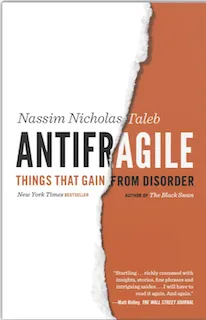Nassim Taleb's Via Negativa
“Actions that remove are more robust than those that add because addition may have unseen, complicated feedback loops.” - Nassim Taleb

A trap I consistently fell in(prob still do) was adding in a thing or action that would alleviate some problem at hand. When I read Nassim Taleb's Anti-Fragile, the concept of Via Negativa connected some dots and rolled back that assumption that all fixes should take form of an outside solution to be added in.
His idea, simplified, is that removing components from a problem is a simpler and less complex strategy than complicating the problem with additional "solutions". The following examples in my own life came to mind.
- code: Once I pair-programmed with my manager. He wrote a unit test and I wrote the code to pass it. He instantly wrecked me(i.e. taught me a lesson) by deleting huge chunks of my unnecessary code and showing the test still passed. He said, "I love deleting code, less bugs". A lightbulb went off in my head because no other devs I worked w/ were interested in minimizing code. Simplifying it, maybe, but not removing code. You can simplify a large, cumbersome function or class and make it readable and easier to grasp, but that isn't the same as removing old vestigial code or lines that do extra, & needless work; preemptive features are very bad as well (see YAGNI)
"In addition, a substantial number of the problems caused by buggy software, which occurs because vendors keep adding more and more features to their programs, which inevitably means more code and thus more bugs" - Andrew Tannenbaum
health:diet - When I started to lift weights I googled all over for the best supplements to take. At 18 I asked the most naive question to my dr: "What should I take or eat to be healthy?". His response was, "What do you mean by healthy exactly?". I had no idea. I'd buy health books with complicated diets. I was looking for a pill or superfoods that would give me a perfect body and health. What I ended up learning was it was much simpler than that. Adding in superfoods like kale and taking supps like L-glutamine were unnecessary. What helped was simplifying my diet. I counted my calories and macros by weighing my food, logging it, and eating the same meals over and over. I lost 12 lbs over 6 months(light caloric deficit). I stopped feeling bloated, had good energy, and was down 35 lbs from my all time high. Lean meats, veggies, and simple carbs were all I needed. And water. I stayed away from marketing gimmicks and stayed in the produce and meat aisles. I also skipped breakfast(sort of an intermittent fast some days). Point is, cutting out most food helped rather than buying and consuming the current trendy diet or potion.
health:mind - Anxiety really hit me hard in college and I never found a solution to it during. Diet & exercise helped a ton after, but I can still get your standard worry and overthinking (re: work/career, life, etc - much more manageable). One topic I would periodically revisit was meditation and one action I consistently do is take walks. My go-to form of comfort during stress or boredom is distraction, via society's newest addiction: internet media (David Foster Wallace would have a field day w/ the current state of things). I can endlessly scroll Twitter/X, watch youtube videos, and IG shorts("chronically online" they call it?). Even watching programming or exercise videos is still distraction, even if I FEEL like I learned. Consuming content, whether trash or "educational", is still consumption & my brain is on auto-pilot. Consumption is fun, but I don't feel better afterwards, usually its the same. What more often than not does make me feel better is taking a long walk &/or turning off the stimulation. Meditation helps, gratitude journaling some, too. Prayers & affirmations, also. Cutting out the stimulation isn't as comforting or fun, but it feels better after.
"And I have friends, intelligent friends, who don't like to read because they get - it's not just bored - there's an almost dread that comes up, I think, here about having to be alone and having to be quiet. And you see that when you walk in. When you walk into most public spaces in America it isn't quiet anymore; they pipe music through. And the music's easy to make fun of 'cause it's usually really horrible music. But it seems significant that we don't want things to be quiet, ever, anymore. " - David Foster Wallace
- writing - I don't write often but it seems like a standard piece of advice is to simplify your writing (use the simplest words possible) and cut out filler phrases/words ("the mouth watering steak had the appearance of premium and exquisite taste" vs "the steak looked delicious"). $10 words used to impress me and if the writing was hard to understand I took that as a signal that it was smart. Now I'm in the camp of Richard Feynman, "If you cannot explain something in simple terms, you don't understand it" and don't waste my time.
Via Negativa has been helpful in different domains in my life and no doubt will continue to be. Thanks for the realization, Taleb.